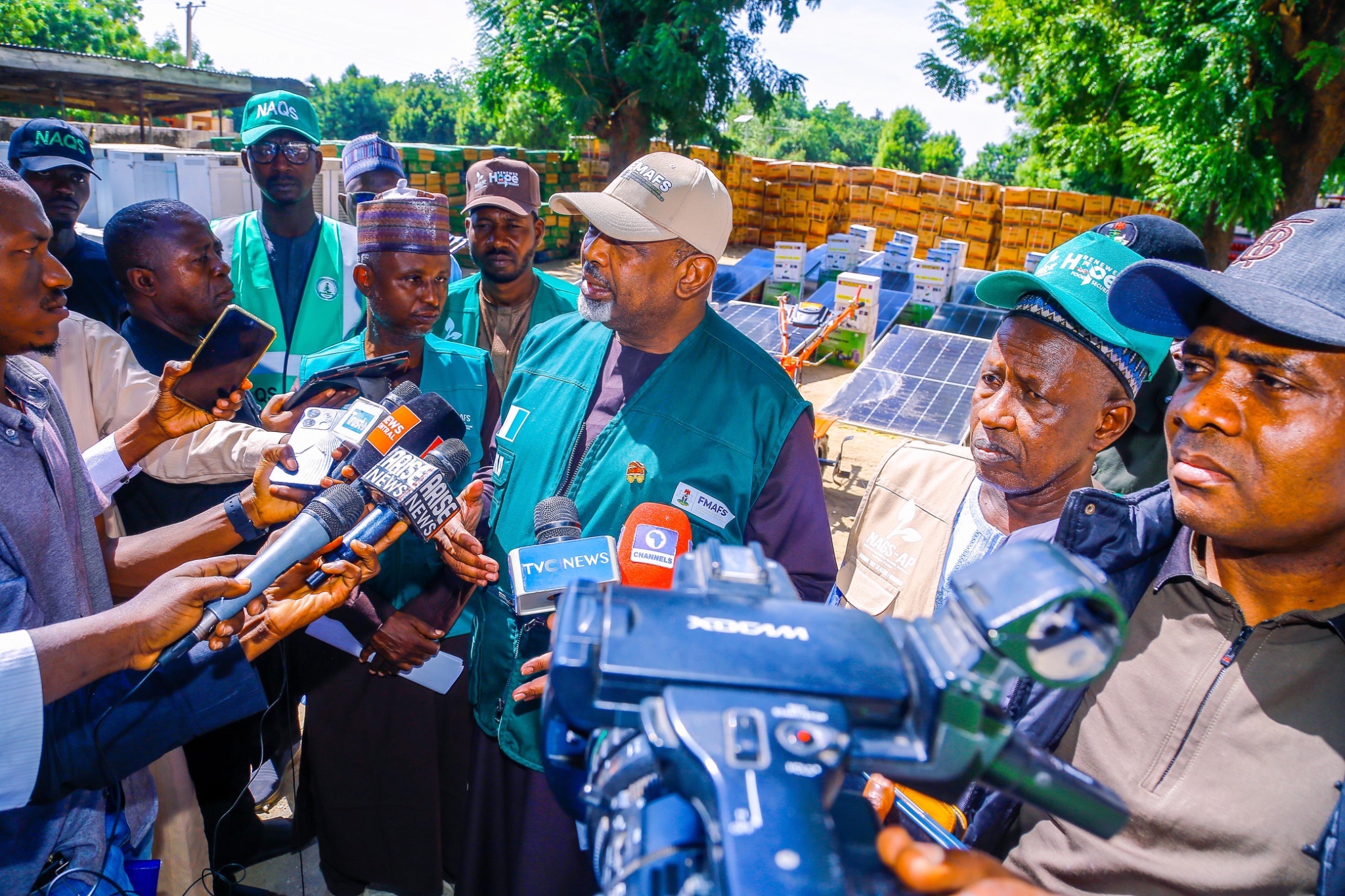

In a major policy shift aimed at strengthening Nigeria’s agricultural backbone and ensuring the transparency of government interventions, the Federal Government has announced plans to create a comprehensive national database for farmers, capturing the size and exact location of farms across the country. The announcement, made in Maiduguri, Borno State, by the Minister of Agriculture and Food Security, Abubakar Kyari, marks one of the most ambitious digital mapping initiatives in Nigeria’s agricultural history.
Speaking during a stakeholders’ engagement on agricultural reforms, Kyari declared that the new system would be developed in partnership with the National Identity Management Commission, whose existing national database and biometric systems will provide the technical support needed to register farmers accurately. The minister emphasized that for too long, government agricultural interventions have been plagued by poor documentation, inflated numbers, and the difficulty of verifying the existence of supposed beneficiaries. According to him, this new database will close those gaps once and for all.
Kyari explained that the integrated platform will not only contain farmers’ personal identification data but will also map the physical location and size of each farm using digital tools. This approach, he said, will help the government track agricultural output, monitor production cycles, and ensure that resources such as fertilizers, improved seeds, machinery, and grants get to the people who genuinely need them. Farmers will now be uniquely identifiable, allowing the government to remove the guesswork from the planning and distribution of agricultural support.
The minister stressed that the exercise is not just a data collection project but a strategic intervention window that will determine farmers’ eligibility for future government programs. With Nigeria striving to ramp up food production amid rising inflation and global supply chain pressures, Kyari described the database as a “critical pillar in the renewed push to achieve national food security.” He added that the sector can no longer depend on manual records or unverifiable lists, especially as the country faces a growing population and increasing food demand.
Residents and stakeholders in Maiduguri welcomed the development with cautious optimism. Many farmers who attended the announcement event noted that past government interventions were often hijacked by non-farmers or political middlemen, leaving genuine farmers underserved. They expressed hope that with a well-structured and transparent database, the longstanding issues of diversion, duplication, and fraud will finally be addressed. Some agriculture experts in the state also pointed out that mapping farms could help improve early warning systems for drought, flooding, pest outbreaks, and other climate-related challenges affecting food production in the region.
For Borno State, where insecurity has significantly disrupted farming activities for more than a decade, the initiative could open a new chapter. Local officials believe that identifying and registering genuine farmers will help the government better support displaced communities trying to return to agriculture, rebuild livelihoods, and stabilize food supply in the Northeast. Kyari himself acknowledged the difficulties faced by farmers in conflict-affected zones and assured that the new system will be sensitive to the realities on the ground, including farmers whose lands have been abandoned or destroyed due to insurgency.
At the federal level, analysts say the move aligns with global best practices adopted in countries striving to modernize their agricultural sectors. Databases and digital maps have been used in nations like India, Brazil, and Kenya to streamline subsidy programs, improve productivity, and attract investment into rural economies. Nigeria’s lack of such a system has often been cited as a major reason why large-scale agricultural interventions fail to yield expected results. With this new step, the government hopes to leverage technology to close the information gap and usher in an era of data-driven policy.
Kyari highlighted that the database will also help Nigeria meet international standards on traceability, especially for export-bound produce. In recent years, several Nigerian agricultural exports have faced rejection due to concerns over contamination, lack of traceability, and poor documentation. A national registry linking produce to identifiable farms could help restore confidence in Nigeria’s agricultural exports, open new markets, and improve the country’s reputation in the global food trade.
However, the minister acknowledged that the success of the initiative will depend heavily on accurate data collection, nationwide sensitization, and cooperation from farmers at the grassroots. He called on state governments, farmer associations, traditional institutions, and extension agents to support the rollout process so that the database reflects the true scale of Nigeria’s agricultural landscape. He also assured that the government will make the registration process easy and accessible, especially for rural farmers who may not be digitally literate.
While the government has not yet set a public deadline for completing the exercise, Kyari hinted that preparations are already underway and that the ministry will soon release detailed guidelines on how farmers can register. He urged farmers not to panic, emphasizing that the process is intended solely to enhance their access to support, not to tax or penalize them. According to him, the goal is to empower farmers, improve food production, and ensure a stronger, more efficient agricultural system that benefits the entire nation.
As Nigeria continues to confront rising food prices, insecurity, and the harsh effects of climate change, the announcement has ignited hope that the long-overdue modernization of the agricultural sector may finally be taking shape. If successfully implemented, the farmer database could become a transformative tool—ensuring that every seed, every acre, and every farmer is accounted for in the national effort to achieve sustainable food security.
For now, the nation waits to see how quickly and effectively the rollout begins, and whether this bold step will mark the beginning of a more transparent, data-driven future for Nigerian agriculture.


